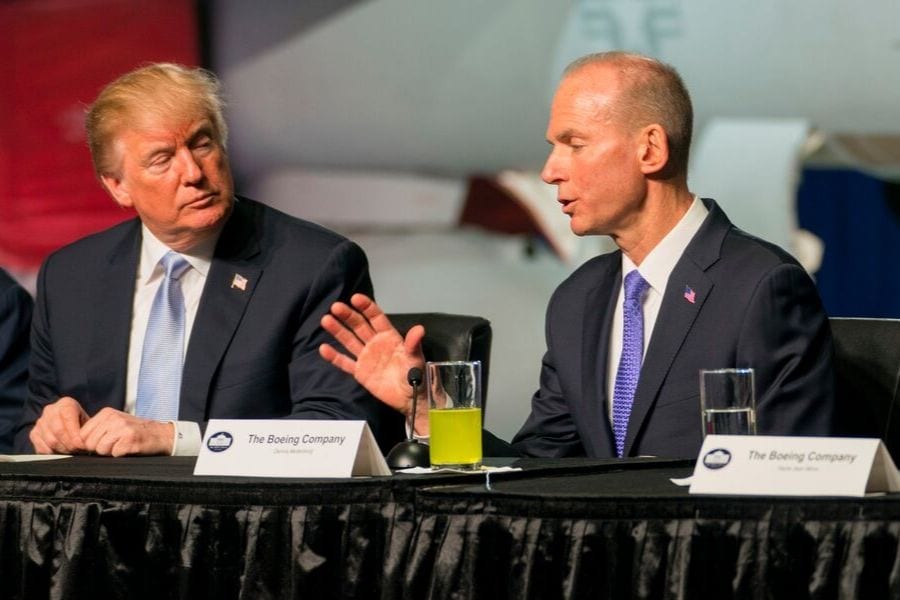How Boeing vs. Airbus became Trump vs. Europe
The Trump administration said it would tax as much as $7.5 billion of European exports annually, the government's boldest-ever step to protect Boeing, the United States' largest manufacturing exporter


 President Donald Trump with Dennis Muilenburg, Boeing"s chief executive, during a roundtable discussion at Boeing"s facility in St. Louis, Mo., March 14, 2018. Boeing won a long-running trade dispute with Airbus, but it came with complications for a company still dealing with the fallout from two deadly accidents. Image: Doug Mills/The New York Times
President Donald Trump with Dennis Muilenburg, Boeing"s chief executive, during a roundtable discussion at Boeing"s facility in St. Louis, Mo., March 14, 2018. Boeing won a long-running trade dispute with Airbus, but it came with complications for a company still dealing with the fallout from two deadly accidents. Image: Doug Mills/The New York Times
Just weeks after his inauguration, President Donald Trump toured Boeing’s factory in North Charleston, South Carolina, holding a rally with workers, admiring a new 787 Dreamliner and calling on the company to bring down the cost of new Air Force One planes.
But Boeing wanted something from Trump, too.
During a private conversation at the event, Boeing’s chief executive, Dennis A. Muilenburg, talked to Trump about a long-running trade dispute between the United States and the European Union that had its roots in the pitched rivalry between Boeing and Airbus, according to three people familiar with the meeting, who spoke on the condition of anonymity to discuss a delicate matter.
The case, which centered on subsidies that Europe provides Airbus, had been working its way through the World Trade Organization for years, but an end was finally in sight. In the event that it was settled on Trump’s watch, Muilenburg urged the president to enforce the ruling, which would mean levying tariffs on European goods.
On Wednesday, Boeing got its wish. After an announcement by the World Trade Organization, the Trump administration said it would tax as much as $7.5 billion of European exports annually.
It was the largest-ever authorized retaliation in the organization’s history, adding another layer of complexity to a global economy already rattled by brewing trade wars and further straining relations between the United States and the EU. And it was the government’s boldest-ever step to protect Boeing, the United States’ largest manufacturing exporter.
“All of those countries were ripping off the United States for many years,” Trump said Wednesday at a news conference with the president of Finland, an EU member. “They know I’m wise to it. We’ve had a lot of wins. This was a $7 billion win. Not bad.”
It was also a win for Boeing, one decades in the making. Boeing has pursued its case against Airbus since the waning days of the Clinton administration, compiling evidence and finally persuading the United States to file a complaint with the WTO in 2004.
Yet this is hardly a clean victory for Boeing. The company is in the midst of the biggest crisis of its 103-year history after the 737 Max was grounded because of two deadly crashes, and has infuriated many of its most important customers with its faltering response. Some of the customers affected by the Max grounding also buy Airbus planes and now face the prospect of higher costs as a result of the tariffs, adding to their frustrations with Boeing.
What’s more, in a case that the WTO is expected to decide next year, Europe accuses the United States of providing illegal subsidies to Boeing. A ruling against the United States could lead to tariffs against Boeing planes sold to European customers. Europe could also find ways to retaliate against the tariffs announced after last week’s ruling.
“It’s a Boeing victory,” said Richard Aboulafia, an aviation analyst at the Teal Group. “But one that may have unintended consequences that are not in Boeing’s interest.”
At issue was the substantial financial support that European countries have given to Airbus in the form of below-market-rate loans that are often forgiven. Without that support, the United States and Boeing argued, Airbus would never have been able to become a true rival to Boeing. With help from those loans, Airbus went from having less than 25% of the market share for large commercial airplanes in 1990 to overtaking Boeing in 2003. Today, Airbus and Boeing roughly split the market for commercial jets.
Boeing hopes the new tariffs will reverse some of those gains. Airlines in the United States will now have to pay at least 10% more for Airbus jets coming from Europe, potentially steering more orders toward Boeing. And the EU may be forced to reconsider its support for Airbus, with the tariffs in place until the two sides negotiate a settlement or the WTO decides that Europe is in compliance with its rules.
Airlines expressed their displeasure with the ruling last week, and the stocks of American Airlines, United Airlines and Southwest Airlines, the three domestic carriers that fly Boeing’s Max, all fell as a result of the pending tariffs.
Delta called them “an unfair tax on U.S. consumers and companies.” JetBlue, which flies only Airbus planes, said it was “concerned about the detrimental impact aircraft tariffs will have” and argued they would “harm customers who rely on us to offer competitive, low fares.”
Other major airlines in the United States did not comment on the tariffs, preferring to avoid publicly criticizing Trump, yet were quietly fuming.
The tariff package could have been worse for Europe and its customers. The Office of the U.S. Trade Representative said it planned to start by levying a 10% tariff on European aircraft and a 25% tariff on agricultural goods, including French wine and Spanish olive oil. Those taxes may be manageable for a time, but leave the United States room to increase pressure in the future.
First Published: Oct 07, 2019, 13:15
Subscribe Now